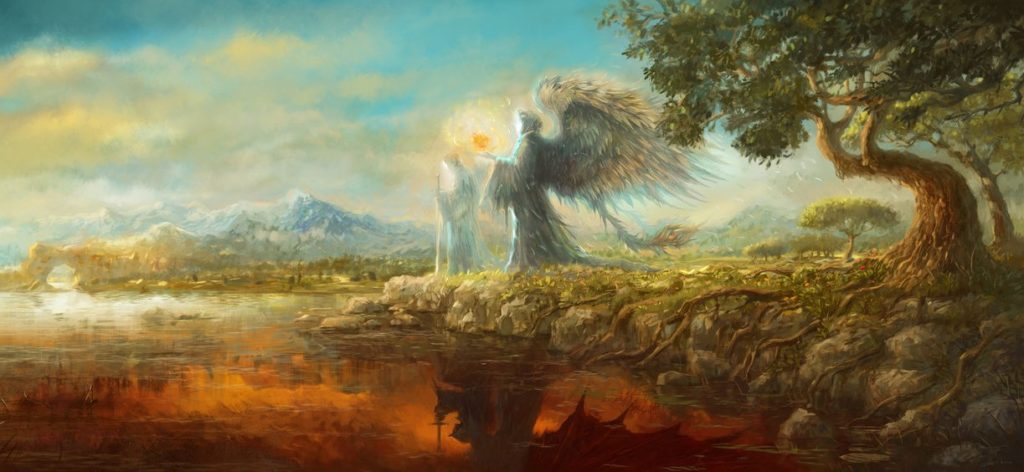Mark 1:13 … Waited upon by Angels (04/28/17)
“He was in the wilderness for forty days, tempted by Satan … And he was with the wild beasts – and the angels waited upon him.” ~ unknown (Mark 1:13)
Note first & foremost that is was “the Spirit” that drove Jesus into the wilderness after his baptism (Mark 1:12) – the Spirit that resided within him at the time; the same Spirit that resides within every sentient being (John 14:20-26); the same Spirit that repeatedly encourages us to go to “the wilderness” as well – to divest from our attachments to possessions & relationships; to release our dependence upon preparation & savings; to confront all personal fears while dismissing all perceived needs (a.k.a. “Satan’s temptations” – see Matthew 4:1-11) ; to be “born anew” once again (John 3:3-8); to allow our Selves to burgeon forth into our conscious awareness; to become again as a “very young child” once more (Matthew 18:3-4) …
Second, note that “forty days” probably did not mean literally forty days in most biblical texts, but rather was a commonly used phrase that meant “a very long time” …
Third, note that the “wild beasts” referenced here included Jesus’ own ego (the co-source of his visions of Satan and the temptations that followed). I have literally tested this verse by heading myself into a literal wilderness on more than one occasion, and can attest to the fact that the human ego does indeed respond insidiously (indeed, much like a “wild beast”) when it is exposed to such a high degree of perceived danger to self …
Fourth, note that the 3 Great Temptations of both Matthew 4:1-11 & Luke 4:1-13 (temptations which most definitely count as fear-filled & fully self-centered “wild beasts” in any “wilderness”) were not present in Mark’s original relaying thereof. That having been said, it was Truth-full for Matthew & Luke to include them in their versions of the story, as any exposure to the elements & the primal fear that accompanies the same will indeed lead the human ego to long for bodily sustenance, to crave power over the elements & to desire immortality (or at the very least an avoidance of imminent death) …
Fifth, note that the angels waited upon Jesus after he had transcended the three great temptations – that angels cannot by their nature wait upon anyone who succumbs to the same; that succumbing to temptation actually prevents angels from reaching the Hearts of those so afflicted …
Sixth, note that this dramatic & Faith-filled time of testing, purification, and strengthening of Self was sandwiched between Jesus’ baptism (when he first felt called to begin a public ministry) and the commencement of his preaching the “Good News” (see Mark 1:14-15) – and thereby note that if we are to truly “follow him” (Matthew 16:28 et al) it would be wise to do something similar; to immerse ourselves in solitude, to divest ourselves from all physical addictions & emotional attachments, and to strengthen our resolve in thereafter setting forth to live as a servant of humanity instead of a slave to safety & self. Indeed, we all must “go into the wilderness” to transcend the ego (see Elijah’s similar journey in 1 Kings 9) – maybe via an actual immersion into the outback, and yet more often than not by confronting fears and dismissing desires in any consciously radical (i.e. culturally unconventional & self-sacrificially courageous) fashion …
Seventh, note in closing that “the wilderness” was actually the Greek “eremo,” a word that simply meant “a desert” or “a deserted place” (Strong’s #2048) — a reference not at all ominous to an Essene like Jesus, seeing as how the Essenes considered “the wilderness” their Home. Yes, Jesus chose extreme austerity while he was there, and yet by all indications he returned “Home” to engage the same.





 ;
;